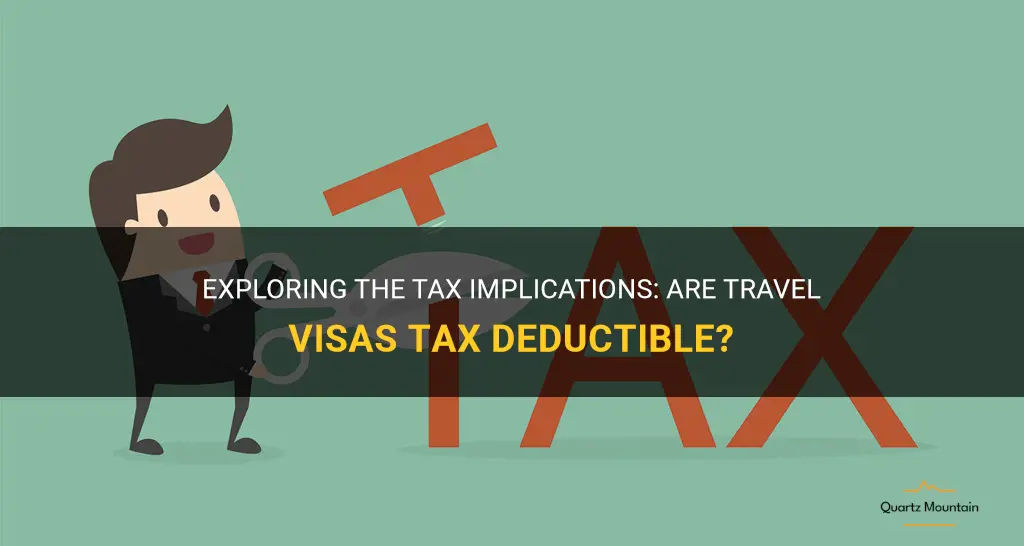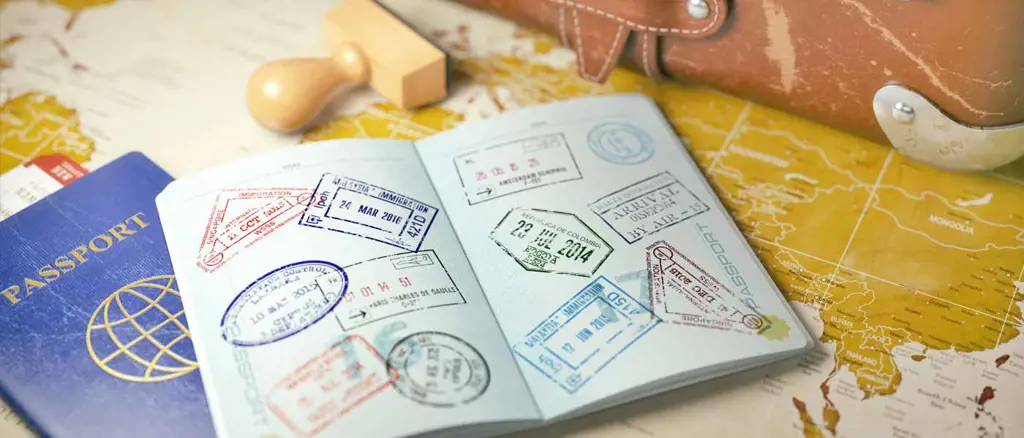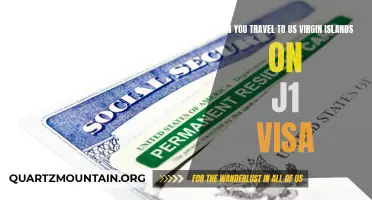
As globetrotters across the world eagerly plan their next international adventure, it's important to consider the various expenses that come along with traveling, including the often-overlooked tax implications. While travel expenses may be a deductible on your tax return, one question remains: are travel visas tax deductible? This intriguing topic delves into the realm of tax laws and explores whether those international visa fees can provide a silver lining come tax season. So, fasten your seatbelts and join us on a journey to uncover the truth behind the tax deductibility of travel visas.
What You'll Learn
- Are travel visas tax deductible for business purposes?
- Can I deduct the cost of travel visas for personal vacations on my taxes?
- Are there specific requirements or limitations for claiming travel visa expenses as a tax deduction?
- How do I document and prove the expenses related to travel visas for tax purposes?
- Are there any specific rules for claiming tax deductions for travel visas for international travel?

Are travel visas tax deductible for business purposes?

When it comes to business travel, expenses can add up quickly. From flights and accommodations to meals and transportation, there are many costs associated with traveling for work. One common expense that often arises is the travel visa. Many business travelers are required to obtain a visa in order to enter certain countries for work purposes. But can these travel visa expenses be tax deductible?
The answer to this question depends on a few factors. In general, the IRS allows for the deduction of ordinary and necessary business expenses. To determine whether a travel visa falls into this category, it's important to consider the purpose of the trip and the specific requirements of the country being visited.
If a business traveler is required to obtain a visa in order to conduct business in a foreign country, it is likely that the visa expense can be considered a deductible business expense. This is because the visa is necessary for the business trip to take place. However, it's important to note that personal travel expenses, such as a tourist visa for a side trip during the business trip, would not be considered tax deductible.
In order to deduct travel visa expenses, the business traveler will need to keep detailed records of the expenses, including receipts and documentation of the purpose of the trip. It's also a good idea to consult with a tax professional or accountant to ensure that all requirements are met and that the deduction is taken correctly.
Additionally, it's important to understand that different countries may have different tax laws and regulations regarding the deductibility of travel visa expenses. Some countries may allow for the deduction of these expenses, while others may not. It's important for business travelers to familiarize themselves with the tax laws of the countries they are visiting in order to determine if the visa expenses are deductible.
To illustrate this concept, let's consider an example. John, a business executive, is required to travel to China for a business conference. In order to enter China, he needs to obtain a business visa. John pays $200 for the visa application fee. Since the visa is directly related to his business trip and is necessary for him to conduct business in China, John can deduct the $200 visa expense as a business expense on his tax return.
In conclusion, travel visa expenses can be tax deductible for business purposes if they are necessary for the business trip to take place. However, it's important to keep detailed records and consult with a tax professional to ensure that all requirements are met. The deductibility of travel visa expenses may also vary depending on the tax laws of the country being visited. Therefore, it's important for business travelers to familiarize themselves with the tax regulations of the countries they are visiting.
Understanding the Differences Between a Travel Document Number and Visa Number
You may want to see also

Can I deduct the cost of travel visas for personal vacations on my taxes?

As tax season approaches, many individuals are wondering about the various deductions they can claim on their taxes. One common question is whether or not the cost of travel visas for personal vacations can be deducted. In most cases, the answer is no.
The Internal Revenue Service (IRS) allows for deductions of certain expenses related to travel, but these deductions are limited to business-related travel expenses. Personal travel expenses, such as the cost of a visa for a vacation, are not typically deductible.
In order to deduct travel expenses, they must be considered ordinary and necessary expenses for the taxpayer's trade or business. This means that the travel must be primarily for business purposes and not for personal enjoyment. Even if there is some business conducted during a personal trip, the primary purpose of the travel must be business-related in order to qualify for deductions.
For example, if a self-employed individual travels to another country for a business conference and extends their trip for a few days to explore the country, the cost of the visa would likely be deductible. However, if the individual is traveling solely for personal vacation purposes and obtains a visa for that purpose, the cost of the visa would not be deductible.
It is important to note that the costs of some travel-related expenses may be deductible, even if the travel itself is not primarily for business purposes. For example, if a taxpayer incurs medical expenses while traveling, those expenses may be deductible if they meet certain criteria.
To determine whether a travel expense is deductible, it is recommended to consult with a tax professional or refer to the IRS publications specific to travel deductions. These publications provide detailed information and guidelines on what qualifies as a deductible travel expense.
In conclusion, the cost of travel visas for personal vacations is generally not deductible on taxes. Deductions for travel expenses are limited to those that are considered ordinary and necessary expenses for business purposes. It is important to consult with a tax professional or refer to IRS publications for specific guidance on travel deductions.
Understanding the Importance of the Travel Document Number on a Visa
You may want to see also

Are there specific requirements or limitations for claiming travel visa expenses as a tax deduction?

Traveling can be an expensive endeavor, and many individuals seek ways to offset some of the costs. One potential avenue for savings is by claiming travel visa expenses as a tax deduction. While this can be a beneficial strategy, there are specific requirements and limitations that must be met in order to qualify for this deduction.
Firstly, it's important to understand that not all types of travel visas are eligible for tax deductions. Generally, only visas obtained for business purposes are eligible. This means that if you traveled for personal reasons or tourism, you may not be able to claim these expenses as tax deductions.
Furthermore, in order to qualify for the deduction, you must be able to prove that the travel visa was necessary for your business activities. This can be demonstrated through documentation such as letters of invitation from overseas business partners, conference registrations, or other evidence of business-related activities.
Additionally, it's crucial to note that the travel visa expenses must be directly related to your business activities. This means that any personal expenses incurred during your trip, such as meals or sightseeing, cannot be claimed as deductions. Only the visa fees, application fees, and any other expenses directly associated with obtaining the visa are eligible for deduction.
To claim travel visa expenses as a tax deduction, you will need to itemize your deductions using Schedule A on your tax return. This requires keeping detailed records of all relevant expenses, including receipts, invoices, and any other proof of payment. It's advisable to consult with a tax professional to ensure that you accurately claim your deductions and comply with all tax laws and regulations.
It's also important to keep in mind that tax laws and regulations are subject to change. Therefore, it's crucial to stay updated regarding any updates or alterations to the tax code that may impact the eligibility and requirements for claiming travel visa expenses as deductions.
To better illustrate the requirements and limitations of claiming travel visa expenses as tax deductions, let's consider an example.
Imagine you are a business consultant who frequently travels internationally to meet with clients. On one of your trips, you need to obtain a business visa for a conference in a foreign country. The visa application fee is $150, and you also incur additional expenses of $100 for expedited processing. In this scenario, you would be eligible to claim the $150 visa application fee as a tax deduction. However, the $100 fee for expedited processing may not be deductible, as it could be perceived as a personal choice rather than a necessary business expense.
In conclusion, claiming travel visa expenses as a tax deduction can be a useful strategy for offsetting some of the costs associated with business travel. However, it's essential to meet specific requirements and limitations in order to qualify for this deduction. By understanding these requirements, keeping accurate records, and consulting with a tax professional, you can ensure that you claim your deductions accurately and comply with all tax laws.
Understanding the Necessity of a Visa for Travel: Everything You Need to Know
You may want to see also

How do I document and prove the expenses related to travel visas for tax purposes?

When it comes to claiming tax deductions for travel expenses, it is essential to keep thorough documentation and be able to provide proof for any expenses claimed. This includes travel visas, which can often be a significant expense for individuals who travel internationally for business purposes. Here are some steps on how to document and prove your travel visa expenses for tax purposes.
Keep Original Receipts:
The first step in documenting your travel visa expenses is to ensure that you keep all original receipts. This is the most crucial piece of evidence when it comes to proving your expenses. Make sure to request a receipt from the embassy or consulate at the time of your visa application or payment. These receipts should clearly state the amount paid, the purpose of the payment, and the date of payment.
Maintain a Detailed Record:
Along with keeping receipts, it is important to maintain a detailed record of your travel visa expenses. This record should include the purpose of your trip, the country you traveled to, the duration of your stay, and the cost of the visa. This documentation will help support your claim and provide context for the expenses incurred.
Separate Visa Expenses from Other Travel Costs:
To make it easier to document and prove your travel visa expenses, it is recommended to separate them from other travel costs. Keep a separate file or folder specifically for your visa-related documentation. This will help you easily locate and retrieve the necessary information when it comes time to file your taxes.
Seek Professional Advice:
If you are unsure about the specific tax regulations regarding travel visa expenses in your country, it is advisable to seek professional advice from a tax accountant or tax attorney. They will be able to guide you on the proper procedures for claiming deductions and provide guidance on the types of documentation and proof required.
Submit Documentation with Your Tax Return:
When it comes time to file your tax return, make sure to include all relevant documentation and proof of your travel visa expenses. Attach the original receipts and any supporting documents, such as your detailed record, to your tax return. Keeping copies of these documents for your personal records is also a good idea.
Example Scenario:
To illustrate the process, let's consider an example where John, a self-employed consultant, had to travel to China for a business conference. He obtained a business visa, which cost him $200. To document and prove this expense for tax purposes, John followed the steps mentioned above. He maintained the original receipt he received from the Chinese Embassy and created a detailed record of his trip, including the purpose, dates, and cost of the visa. Before filing his tax return, John consulted his tax accountant, who confirmed that he could claim the visa expense as a deduction. John then attached the receipt and detailed record to his tax return and submitted it to the tax authorities.
In conclusion, documenting and proving travel visa expenses for tax purposes is crucial to ensure that you can claim the appropriate deductions. By keeping original receipts, maintaining detailed records, separating visa expenses from other travel costs, seeking professional advice, and submitting the required documentation with your tax return, you can confidently claim these expenses and potentially reduce your tax liability. Remember to consult the specific tax regulations in your country and seek professional advice where necessary.
Traveling to Canada with an H1B Visa: What You Need to Know
You may want to see also

Are there any specific rules for claiming tax deductions for travel visas for international travel?

When it comes to international travel, one of the expenses that can quickly add up is the cost of travel visas. These visas are necessary for crossing international borders, and the fees associated with them can sometimes be quite hefty. Luckily, there are certain circumstances in which you may be eligible to claim tax deductions for these expenses.
Before we delve into the specific rules for claiming tax deductions for travel visas, it's important to understand the general guidelines for deducting travel expenses. In order for any travel expense to be tax deductible, it must be considered both ordinary and necessary for your business or profession. This means that the expense should be common and accepted in your industry, and it should also be directly related to the operation of your business.
Now, let's look at how these guidelines apply to travel visas. In most cases, travel visas are not considered ordinary and necessary expenses for the operation of a business. They are typically seen as personal expenses, as they are required for international travel rather than specifically tied to a business activity. As such, claiming a tax deduction for travel visas can be challenging.
However, there are a few exceptions to this general rule. If you can demonstrate that the travel visa is directly related to your business or profession, you may be able to claim a deduction. For example, if you are a professional athlete competing in an international event and the travel visa is required for your participation, you may be able to deduct the cost. Similarly, if you are a performer or speaker invited to an international conference and the travel visa is necessary for your attendance, you may also be eligible for a deduction.
To claim a tax deduction for a travel visa, you will need to provide evidence that proves its direct relationship to your business or profession. This may include documentation such as invitation letters, event schedules, or contracts that demonstrate the purpose of your international trip. It's important to keep detailed records of these documents, as they will be necessary for supporting your deduction claim.
It's also worth noting that tax laws and regulations regarding travel expenses can vary from country to country. If you are traveling internationally for business purposes, it's advisable to consult with a tax professional who is familiar with the specific tax rules in both your home country and the country you are visiting. They will be able to provide guidance on the deductibility of travel expenses, including travel visas, based on your individual circumstances.
In conclusion, claiming tax deductions for travel visas for international travel can be complex. Generally, travel visas are considered personal expenses and are not eligible for deductions. However, there are exceptions for cases where the travel visa is directly related to your business or profession. To claim a deduction, you will need to provide evidence that demonstrates the purpose of your international trip. It's always best to consult with a tax professional to ensure compliance with tax laws and regulations.
How Can I Travel to the Bahamas on an H1B Visa?
You may want to see also
Frequently asked questions
No, travel visas are not tax deductible. Tax deductions are typically reserved for business expenses that are necessary for the operation of a business. Since travel visas are generally for personal travel purposes, they are not eligible for tax deductions.
Yes, if you are traveling for business and require a travel visa, you may be able to deduct the cost of the visa as a business expense. However, it is important to keep detailed records and receipts to support your deduction in case of an audit.
No, travel visas for medical purposes are not tax deductible. While medical expenses can be deducted under certain circumstances, the cost of a travel visa specifically is not eligible for deduction.
No, travel visas for educational purposes are not tax deductible. Similar to medical expenses, educational expenses may be deductible under certain circumstances, but the cost of a travel visa specifically is not eligible for deduction.







